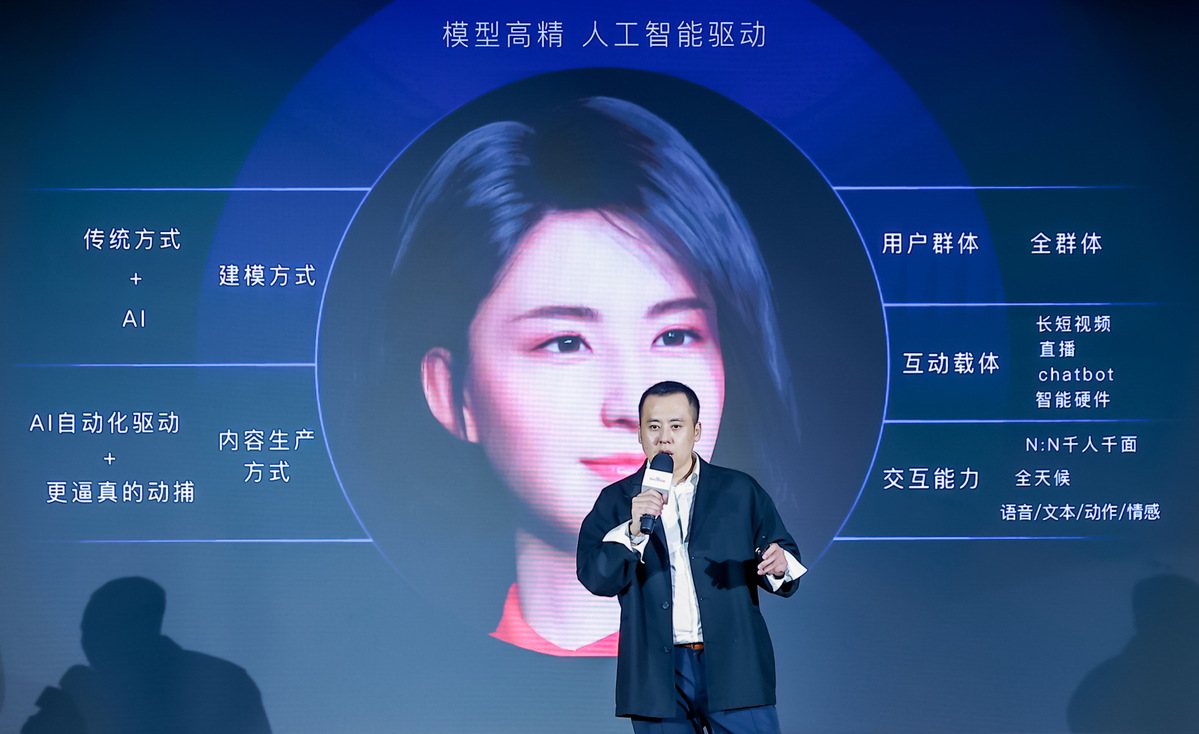Virtual humans poised for big advances


Gestures, expressions, voices getting closer to those of real people
China's virtual human industry is poised for rapid growth, with applications in sectors such as broadcasting, entertainment, retail, finance and education. It is also possible that everyone eventually will have their own avatar, experts said.
Gestures, expressions and the voice of digital humans will come closer to that of real people with technological advances such as artificial intelligence, computer graphics and motion capture, they said. Motion capture is a technology that can assess a person's movements and translate them into a computer-generated 3D character.
Chinese tech giant Baidu Inc has released its digital avatar platform, Xiling, which integrates the generation of digital humans and content production, as the company looks to leverage its artificial intelligence capabilities in the fast-growing metaverse. The metaverse is the immersive online world where people can gather virtually and interact thanks to advanced technologies.
The platform provides a complete set of services for the creation and operation of virtual hosts, virtual celebrities and virtual brand spokespersons for clients in the fields of broadcasting, television, internet, finance and retail, enabling more industries to use virtual humans.
User demand and advancement in technology have become the core driving forces in the digital human sector, said Li Shiyan, director of Baidu's Intelligent Cloud AI human-computer interaction laboratory.
Policy support, capital inflow and the enhancement of computing capacities have also boosted the development of the digital avatar industry, Li said.
Several artificial intelligence-powered technologies like natural language understanding, voice interaction and intelligent recommendation have been utilized to create digital avatars, according to Baidu.
The metaverse, among the hottest tech buzzwords, promises a future in which the virtual and physical worlds are inextricably interconnected. Digital avatars serve as a human-computer interface and are expected to become the fastest-growing industry and a revenue generator in the metaverse, experts said.
China Central Television (CCTV) and Baidu AI Cloud have announced the debut of the first AI sign language anchor, which is being used during the Beijing 2022 Olympic and Paralympic Winter Games.
Baidu's sign language translation engine and natural action engine give the AI sign language anchor a greater capacity for being understood in sign language expression as well as an accurate and coherent presentation, the company said.
The Xiling platform has also produced a series of digital humans, such as the CCTV virtual host and Baidu virtual spokesperson named Xijiajia.
Baidu has worked in cooperation with Shanghai Pudong Development Bank, China Everbright Bank and China Unicom to launch a one-to-one service-oriented digital human to enhance operational efficiency and reduce labor costs.
However, there are some bottlenecks that hinder the large-scale application of digital avatars, Li said.
Each link of the digital avatar industrial chain is relatively fragmented, meaning there is not enough efficient coordination between them. Service-oriented digital avatars also cannot establish an emotional bond with users, and they are expensive to produce.
Li said at present, several technologies like computer modeling, creation of multidimensional images and motion capture have been mastered by overseas companies, while Chinese enterprises are gaining the upper hand in the application field.
The total size of China's virtual human market is forecast to reach 270 billion yuan ($42.58 billion) by 2030, according to an industry report released by QbitAI, an industry services platform focusing on AI and cutting-edge technology.
The revenue generated by virtual humans designed with specific characteristics, such as virtual celebrities, is expected to reach 175 billion yuan in China by 2030, while service-oriented virtual humans are forecast to exceed 95 billion yuan, the report said.
Yu Jianing, executive director of the metaverse industry committee at China Mobile Communications Association, a Beijing-based industry association, said the accelerated application of 5G and the research and development of 6G, the next-generation wireless technology, will fuel the digital human industry.
"Although the digital avatar segment is still in a nascent stage, the appearance, gestures and actions of digital humans will be more refined and closer to that of real humans in 2022," Yu said, adding the virtual humans will become more intelligent and be able to give personalized feedback based on real-time information along with the advancement in AI-based technologies.
Digital humans will no longer be limited to cultural and creative fields such as virtual celebrities. Instead, they will become integrated with a variety of industries to boost the real economy.
In addition, the country has released policies to encourage the innovative development of virtual humans, he added.
China will promote the wide application of virtual anchors and animated sign language presenters in the production of news broadcasting, weather forecasting, variety shows and science and education programs, according to a plan published by the National Radio and Television Administration in October.
The global digital human market is expected to reach $527.58 billion in 2030, with a compound annual growth rate of 46.4 percent, according to recent analysis by Emergen Research, a global market research and consulting company.
Pan Helin, executive dean of the Digital Economy Research Institute at the Zhongnan University of Economics and Law, said the biggest obstacle to the large-scale application of virtual humans is the technology, because it is difficult for virtual humans to effectively complete tasks in complicated scenes, and also the cost of intelligent applications is high.
The interactive experience with digital avatars will need to be improved continually to give users a greater sense of reality when interacting with virtual humans, Pan said.




































